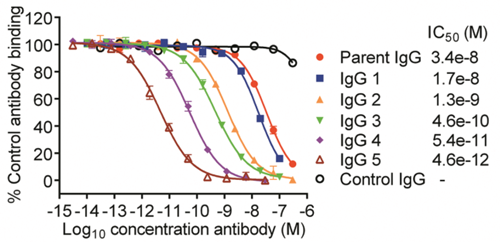Lead isolation and lead optimization
Lead isolation: screen for Biologics binders
Revvity’s Protein-Protein Interaction reagents (PPI) are the preferred tools for the scientist who needs to screen medium to large biologics libraries produced by hybridoma or in periplasmic crude extract. The PPI product line displays compelling advantages in terms of throughput, accuracy, speed, and versatility compared to existing state of the art technologies.
Let’s see an example from the literature of anti PIGF blocking antibody screening in Receptor/ligand interactions:
VEGFR/PIGF1,2 binding assay:
The aim of the assay is to identify antibodies that block the interaction between PIGF1 and the VEGFR receptor.
More than 14000 hybridoma samples were screened using this high throughput format.


C.J.Rossant / Journal of Biomolecular Screening 2015, Vol. 20(4) 508–51
Lead optimization: affinity maturation
Biologics engineering or lead optimization is a key step to reach low picomolar affinities. The affinity maturation studies should be processed in parallel with epitope characterization analyses to improve the efficacy of your drug candidates.
Example of parental PIGF1 affinity maturation study:
An HTRF epitope competition assay was set up to select engineered antibodies with improved affinities over the parent anti PIGF1 antibody.
Access this publication to see how researchers took advantage of HTRF to screen and optimize their biologics (C. J. Rossant / Journal of Biomolecular Screening 2015, Vol. 20(4) 508–518)


Epitope competition assays to identify high-affinity antibodies to placental growth factor (PIGF)
Functional characterization
Highlight cell signaling modulation
Understanding the biological pathway modulated by your drug is crucial to increase the likelihood of success in biologics drug developments. Revvity’s cell based functional kits, including GPCRs, cytokines and phospho-proteins assays, provide efficient means to delineate the biologics’ mechanism of action, opening new opportunities for the development of drugs with improved patient clinical benefits.
Antibody-dependent-cell-cytotoxicity (ADCC) function
Revvity has developed a unique platform of Fc Gamma Receptor (FcgR) Tag-lite™-based cellular assays for measuring Fc-specific antibody binding. These assays are ideal for predicting the functional ADCC activity, and can also be used to assess the degree of antibody afucosylation.
Upstream bioprocessing
Our biotherapeutic product line extends beyond antibody development to biomanufacturing and quality control. Revvity proposes ready-to-use kits that quantify antibodies or antibody fragments rapidly, as well as kits for detecting CHO host cell protein contamination.
Our high throughput assays for CHO HCP detection support automatization and avoid washing steps during cost and time effective biopharmaceutical development. These products, using AlphaLISA™ or HTRF™ technologies, support you in working on small sample sizes with their capacity to miniaturize, as well as ensuring a wide dynamic range of detection.

IgG kits
A panel of ready-to-use kits help you to quantify human, mouse, rabbit IgGs, and Fc-containing proteins. These assays offer a homogeneous, easily miniaturized alternative to conventional ELISAs and are compatible with culture media and cell periplasmic extracts.































